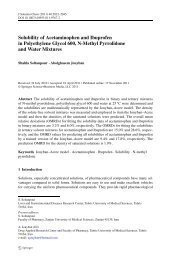new insights into the prevention and treatment of bulimia nervosa
new insights into the prevention and treatment of bulimia nervosa
new insights into the prevention and treatment of bulimia nervosa
You also want an ePaper? Increase the reach of your titles
YUMPU automatically turns print PDFs into web optimized ePapers that Google loves.
22<br />
New Insights <strong>into</strong> <strong>the</strong> Prevention <strong>and</strong> Treatment <strong>of</strong> Bulimia Nervosa<br />
<strong>treatment</strong>, as well as in coping with <strong>the</strong> aforementioned bulimic symptoms <strong>and</strong> destructive<br />
feelings (especially <strong>the</strong> feeling <strong>of</strong> guilt) which <strong>the</strong> person suffers from in everyday life.<br />
Application <strong>of</strong> <strong>the</strong> mirror technique allows <strong>the</strong> protagonist to observe his or her own<br />
bahaviour as reflected by ano<strong>the</strong>r person, <strong>and</strong> watch <strong>the</strong> enactment <strong>of</strong> him/herself from<br />
outside. The patient adopts <strong>the</strong> so called metaposition <strong>of</strong> an audience member, <strong>and</strong> his or<br />
her role on <strong>the</strong> stage is acted out by a double. Taking on <strong>the</strong> role <strong>of</strong> an observer helps <strong>the</strong><br />
protagonist adopt a less emotional approach to stage enactment, fosters self-reflection, <strong>and</strong><br />
provides <strong>the</strong> person with a cognitive <strong>and</strong> intellectual insight <strong>into</strong> <strong>the</strong> factors underlying his<br />
or her bulimic symptoms.<br />
4. Application <strong>of</strong> monodrama in individual psycho<strong>the</strong>rapy aimed at<br />
investigating compensatory behaviours <strong>and</strong> bulimic symptoms<br />
When I manage to establish a successful <strong>the</strong>rapeutic relationship with my bulimic patient,<br />
he or she gradually starts to reveal <strong>the</strong> negative, repeatedly accumulating life experiences,<br />
<strong>and</strong> uncomfortable disease symptoms <strong>the</strong> sufferer has to cope with. At this stage, <strong>the</strong> patient<br />
is frequently very reluctant to accept <strong>the</strong> fact that <strong>bulimia</strong> <strong>nervosa</strong> is a recurrent disease. A<br />
bulimic person <strong>of</strong>ten suffers from abnormally low self-esteem, which usually determines <strong>the</strong><br />
individual’s negative (auto-destructive) view <strong>of</strong> oneself <strong>and</strong> <strong>the</strong> surrounding world (“I am<br />
nobody, I am nothing”).<br />
When bulimics approach a <strong>the</strong>rapist, seeking his or her help, <strong>the</strong>y frequently talk about <strong>the</strong><br />
feelings <strong>of</strong> pain, remorse, anxiety <strong>and</strong> shame, which are related to <strong>the</strong> compensatory<br />
behaviours that <strong>the</strong>y engage in, such as binge eating or self-induced vomiting. I recall <strong>the</strong><br />
words <strong>of</strong> my bulimic patients who tend to complain: “It is so hard for me; I didn’t make it<br />
again; I went on a binge again; I’d ra<strong>the</strong>r disappear than live this kind <strong>of</strong> life”, or <strong>the</strong>y say: “I<br />
cried over myself; I could feel pain all over my body just after <strong>the</strong> binge; I stuffed myself like<br />
a pig; It won’t work; I’m a looser; Each time I do it, I promise myself that it is going to be <strong>the</strong><br />
last time, but it doesn’t make sense.” O<strong>the</strong>r female patients <strong>of</strong>ten confess: “After <strong>the</strong> binge I<br />
feel like scrubbing everything out, wash <strong>and</strong> clean everything, I always wash myself after<br />
<strong>the</strong> binge to cover up all <strong>the</strong> tracks, to forget…; I have never felt such self-disgust before, I<br />
feel I am nothing when I do it, I puke, I stink <strong>and</strong> I don’t know what is going to happen<br />
next”. I realize that in <strong>the</strong> context <strong>of</strong> auto-destructive thoughts reported by my patients, <strong>and</strong><br />
<strong>the</strong>ir denial <strong>of</strong> body image, I should make an attempt at integrating monodrama with such<br />
<strong>the</strong>rapeutic approaches as a <strong>the</strong>rapeutic dialogue <strong>and</strong> psychodynamic psycho<strong>the</strong>rapy which<br />
focuses on conducting transference analysis <strong>and</strong> developing cognitive <strong>and</strong> emotional insight<br />
by means <strong>of</strong> verbal <strong>the</strong>rapeutic interventions such as clarification, confrontation <strong>and</strong><br />
interpretation. Monodrama is a psychodramatic technique in which <strong>the</strong>re is only one<br />
participant – a protagonist, who is asked by a director to select a group <strong>of</strong> props (e.g. objects,<br />
scarves), which take on <strong>the</strong> role <strong>of</strong> an auxiliary ago. If I receive my patient’s consent, I start<br />
investigating his or her bulimic symptoms (I place special emphasis on <strong>the</strong> cycle: binge<br />
eating-vomiting- <strong>the</strong> feeling <strong>of</strong> guilt), employing such monodrama techniques as role<br />
reversal, mirroring, doubling, or surplus reality. In <strong>the</strong> last <strong>of</strong> <strong>the</strong> aforementioned<br />
techniques, <strong>the</strong> director invites <strong>the</strong> protagonist to enact <strong>the</strong> unreal, “imaginary” scenes from<br />
his or her life, to act out what had never happened, but what <strong>the</strong> person would have liked to<br />
happen, to “undo” what was done, <strong>and</strong> to do what needs to be done. Thus, surplus reality<br />
helps transcend <strong>the</strong> boundaries <strong>of</strong> <strong>the</strong> "real world" <strong>of</strong> <strong>the</strong> protagonist; it is reenactment <strong>of</strong> a<br />
traumatic situation in which <strong>the</strong> protagonist can take corrective action [Tomalski,














![focuspdca.ppt [Compatibility Mode]](https://img.yumpu.com/22859457/1/190x146/focuspdcappt-compatibility-mode.jpg?quality=85)


